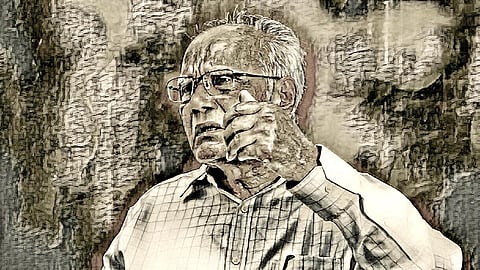- Commentary
- History Vignettes
- Notes on Culture
- Dispatches
- Podcasts
- Indian LanguagesIndian Languages
- Support

For much of their despicable history since Independence, those who today call themselves as Left-Liberals used to proudly proclaim that they were “Progressives,” “Comrades” and “Marxists.” History was on their side, they said. They were after all, the proud flag-bearers and soldiers walking the Revolutionary March of History which would surely culminate in a Workers Paradise on earth. They were unstoppable. No less than Prime Minister Indira Gandhi was in their thrall. Just a few years ago, they had gotten Indira Gandhi to gift them Jawaharlal Nehru University, the sprawling real-estate ideological bounty. And they brooked no opposition. Their opponents had only three options: remain silent, get coopted, or be destroyed. Every tactic was fair. After all, Paradise was just around the corner. What did these ignorant opponents know about Revolution and Equality and Justice?
Long story short, there is a PhD-level research project waiting to be written: of the hundreds of careers and lives that these toxic eminences have destroyed in their Jihadi zeal to somehow turn India into a Communist state. These are the same folks who began howling about how India became intolerant after 16 May 2014. Only, the cruel and farcical joke is the fact that they call themselves Liberals and not the despotic Communist ideologues that they really are. Which is why it is essential to constantly remind the country of their long and sordid record of misdeeds in public life and the protracted history of their cultural vandalism.
In that spirit, we present another sample of the manner in which they tried to violently obstruct the literary career of no less a person than Dr. S.L. Bhyrappa.
Here’s the full story.
Two things had occurred in Dr. S.L. Bhyrappa’s life in 1971. He had taken a transfer from NCERT, Delhi to the Regional College of Education in Mysore, his Karma Bhoomi. He had simultaneously begun the groundwork for writing his magnum opus, the modern classic, Parva, which easily stands shoulder-to-shoulder with any classic in world literature. Parva was the magnificent culmination of ten years of solid, meditative work from the time the idea for the novel was seeded in his mind to its final publication in 1979. In the interim, he had authored five more novels.
In 1975, Dr. Bhyrappa returned to Mysore by train after receiving the Sahitya Akademi Award in Delhi for his other classic, Daatu. At the railway station, he was met by two of his close friends who told him that his wife had sent them to pick him up, fearing for his safety if he came home directly. At the time, Dr. Bhyrappa had taken unpaid leave from his teaching duties at college in order to concentrate on writing Parva.
There was a short backstory to this.
While Dr. Bhyrappa was away, a spate of continuous, nightly stone attacks had suddenly been unleashed on his house. Undaunted, Dr. Bhyrappa went home from the station. But the attacks didn’t stop. On the contrary, they intensified and went on for over three months. Here’s how he describes it:
Dr. Bhyrappa approached the police who sent a couple of constables for night security. For the four days they were there, nothing happened. Satisfied at some kind of “buffoonish” victory, they withdrew. The attacks resumed right on the fifth night. Dr. Bhyrappa then approached the Mysore Police Superintendent. This time, a Mufti squad was arranged. But the outcome was similarly unsuccessful: the miscreants escaped undetected.
Then Dr. Bhyrappa made a firm decision. He writes:
Eventually, a psychiatrist helped Dr. Bhyrappa’s wife overcome her depression.
But news of these stone-pelting attacks was splashed prominently in all newspapers in Karnataka when G. Narayana, the then chief of the Kannada Sahitya Parishad, mentioned it in a public felicitation ceremony for Dr. S.L. Bhyrappa winning the Sahitya Akademi Award for Daatu. A red-faced Government then directed the Intelligence Bureau to investigate. Two weeks later, a Police Inspector landed up at Dr. Bhyrappa’s house and narrated the full story behind the nightly attacks. Dr. Bhyrappa recounts the conversation:
Then the Inspector told Dr. Bhyrappa that there were police records which showed that both litterateurs were heavily involved in political intrigue, and that he would summon both and warn them. Dr. Bhyrappa writes,
Note the year: 1975. About four full decades before the deadly dawn of Kashmiri stone-pelters.
Oh! By the way, the artful litterateur that Dr. S.L. Bhyrappa mentions eventually went on to win the Jnanapith Award.
Dr. S.L. Bhyrappa: Bhitti. Passages translated by Sandeep Balakrishna. Emphasis added.
The Dharma Dispatch is now available on Telegram! For original and insightful narratives on Indian Culture and History, subscribe to us on Telegram.
